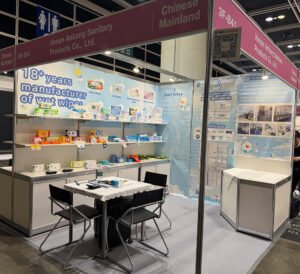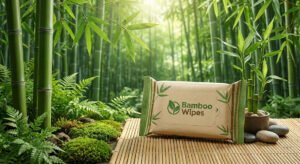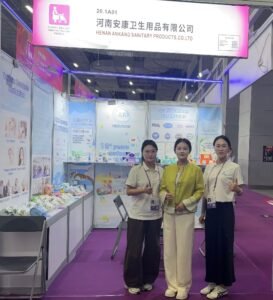Have you ever stopped to consider the everyday items we use that have a profound impact on our planet? It’s a moment of clarity, isn’t it? For us, in the world of wet wipes manufacturing, that moment arrived with the burgeoning demand for sustainability. And at the forefront of this green revolution? Bamboo wipes. They’re not just a passing trend; they represent a fundamental shift in how consumers view personal care and environmental responsibility. As a manufacturer, we’ve been at the heart of this transformation, witnessing firsthand the remarkable evolution of this product. Let’s unravel the mystery and allure of bamboo wipes together.
The Unforeseen Rise of Bamboo Wipes: A Paradigm Shift in Personal Care
The journey of the wet wipe has been fascinating. From a convenient cleaning tool, it has morphed into a product under intense scrutiny for its environmental footprint. Traditional wet wipes, often made from synthetic fibers like polyester and polypropylene, have long been a source of concern due to their non-biodegradable nature, contributing significantly to landfill waste and microplastic pollution. But what if there was a better way? What if a natural, rapidly renewable resource could offer a superior alternative? This is where bamboo stepped onto the scene, not as a sudden revelation, but as a growing, undeniable force.
The initial skepticism surrounding “natural” alternatives quickly dissipated as the tangible benefits of bamboo became apparent. Consumers, increasingly informed and environmentally conscious, began to demand products that aligned with their values. This wasn’t just about being “green”; it was about recognizing the tangible superiority of a material that offered both efficacy and environmental responsibility. For us, as manufacturers, it was a clear signal: the market was speaking, and it was speaking about bamboo.
Unveiling the Unique Features of Bamboo Wipes: More Than Just a Plant
So, what exactly makes bamboo wipes so special? It’s far more than just the novelty of using a plant-based material. It’s about a unique confluence of characteristics that addresses many of the shortcomings of their synthetic counterparts. Let’s delve into the specific features that set bamboo wipes apart.
Firstly, and perhaps most crucially, is their sustainability and biodegradability. Bamboo is a marvel of nature. It’s one of the fastest-growing plants on Earth, requiring minimal water and no pesticides to thrive. This rapid regeneration means it’s an incredibly renewable resource, unlike the finite petroleum-based materials used in many traditional wipes. Furthermore, bamboo fibers are naturally biodegradable and compostable, meaning they break down into organic matter, returning to the earth without leaving behind harmful residues. This is a game-changer for landfills and our oceans. Imagine the impact if every wet wipe used today could simply disappear, leaving no trace. That’s the promise of bamboo.
Beyond their environmental credentials, bamboo wipes boast an impressive array of tactile and performance-based features. They are inherently soft and gentle, thanks to the naturally smooth and round fibers of bamboo. This makes them ideal for sensitive skin, particularly for babies and individuals prone to allergies or irritation. Have you ever felt the difference between a rough, synthetic wipe and a soft, plush bamboo one? It’s a revelation, isn’t it? This inherent softness translates directly to a more comfortable and less abrasive cleaning experience.
Another remarkable feature is their hypoallergenic and antibacterial properties. Bamboo contains a natural bio-agent called “bamboo kun,” which is believed to give the plant its natural resistance to pests and fungi. While the extent to which this translates to the finished wipe product is debated, many users report fewer instances of skin irritation when using bamboo wipes, attributing it to these natural properties and the absence of harsh chemicals often found in synthetic wipes. This makes them a trusted choice for parents and those seeking gentler personal care options.
Furthermore, bamboo wipes often exhibit superior absorbency and strength. The unique structure of bamboo fibers allows them to absorb more liquid than cotton or synthetic fibers, making them highly effective for cleaning. Despite their softness, they are surprisingly durable and tear-resistant, standing up to rigorous use without falling apart. This combination of strength and absorbency means you often need fewer wipes to get the job done, leading to greater efficiency and potentially less waste.
Finally, the absence of harsh chemicals and fragrances is a significant selling point for many consumers. While not all bamboo wipes are chemical-free, many brands prioritize a minimalist approach, opting for pure water and natural ingredients. This resonates deeply with consumers who are increasingly wary of synthetic fragrances, parabens, phthalates, and other potentially irritating additives. It’s about giving consumers peace of mind, knowing they are using a product that is as close to nature as possible.

The Undeniable Benefits: Why Consumers Are Embracing Bamboo Wipes
The features we’ve discussed translate directly into a compelling list of benefits for the end-user, driving the exponential growth in demand for bamboo wipes. It’s not just about doing good for the planet; it’s about experiencing a superior product.
The most obvious benefit, and one that resonates deeply with a broad spectrum of consumers, is their eco-friendliness. In a world grappling with plastic pollution and climate change, choosing biodegradable and sustainably sourced products is no longer a niche preference but a mainstream expectation. Consumers are actively seeking ways to reduce their environmental footprint, and switching to bamboo wipes is a tangible, easy step they can take. It’s a small change with a big collective impact.
For parents, the gentleness and safety for sensitive skin are paramount. Baby skin is incredibly delicate and susceptible to irritation. The hypoallergenic and naturally soft nature of bamboo wipes provides a much-needed alternative to conventional wipes that can often cause rashes and discomfort. We’ve seen countless testimonials from parents who have found relief for their babies’ sensitive skin after switching to bamboo, and this word-of-mouth endorsement is incredibly powerful.
Beyond babies, individuals with allergies, eczema, or generally sensitive skin also find immense relief. The reduction in harsh chemicals and the natural properties of bamboo often lead to fewer adverse reactions, making daily personal hygiene a more comfortable experience. It’s about comfort and well-being, translating directly into a better quality of life for those who struggle with skin sensitivities.
The versatility of bamboo wipes is another key benefit. While initially popular for baby care, their applications have expanded dramatically. They are excellent for adult personal hygiene, makeup removal, general household cleaning, and even pet care. Their strength and absorbency make them effective for a wide range of tasks, simplifying daily routines for many. Imagine a single wipe that can handle both a diaper change and a quick spill on the kitchen counter – that’s the kind of practical utility bamboo wipes offer.
Finally, there’s the peace of mind that comes with using a natural, sustainable product. Knowing that you are making a conscious choice to protect the environment and provide the best for yourself and your family is a powerful motivator. This emotional connection to the product is a significant driver of consumer loyalty and repeat purchases.
Pioneering Your Own Brand: How to Start a Bamboo Wet Wipe Business
The burgeoning market for bamboo wipes presents a compelling opportunity for entrepreneurs. If you’re looking to enter the sustainable personal care industry, starting your own bamboo wipe brand can be a rewarding venture. From our perspective as a manufacturer, we can offer a roadmap, highlighting the crucial steps and considerations.
1. Market Research and Niche Identification: Before anything else, understand your target audience and identify a specific niche. Are you focusing on baby wipes, adult hygiene, makeup removers, or perhaps even specialized cleaning wipes? Research your competitors. What are they doing well? Where are their gaps? What unique selling proposition (USP) can you offer? Perhaps it’s a specific formulation (e.g., infused with aloe vera or chamomile), unique packaging, or a strong social mission. Don’t just be another brand; be a better or different brand.
2. Product Development and Formulation: This is where the magic happens. You’ll need to decide on the specifics of your wipe. * Bamboo Material: While all bamboo wipes use bamboo fibers, there can be variations in the grade and weave. Discuss options with your manufacturer. * Solution/Formula: This is critical. Will your wipes be water-based, or will they include natural extracts like aloe vera, chamomile, or essential oils? Will they be fragrance-free or lightly scented with natural fragrances? Crucially, ensure your formula is free of harsh chemicals, parabens, phthalates, and other undesirable ingredients. This is a non-negotiable for the bamboo wipe market. You’ll need to consider pH balance, preservation systems, and skin compatibility. * Wipe Size and Count: Determine the dimensions of your wipes and how many will be in each pack. Consider different pack sizes to cater to various needs (e.g., travel packs, multi-packs). * Flushability and Compostability: If these are key features you want to promote, ensure your wipes meet relevant certifications and standards for flushability (e.g., INDA/EDANA guidelines) and compostability (e.g., ASTM D6400). This can be a complex area, so work closely with your manufacturer.
3. Choosing a Manufacturing Partner (Us!): This is arguably the most crucial step. As a wet wipes manufacturer, we bring expertise, infrastructure, and economies of scale. When selecting a partner, consider: * Experience with Bamboo Wipes: Do they have a proven track record in manufacturing bamboo-based products? * Certifications: Do they hold relevant certifications (e.g., ISO, GMP, organic certifications)? * Quality Control: What are their quality control processes like? * Minimum Order Quantities (MOQs): Understand their MOQs and if they align with your business plan. * Customization Capabilities: Can they accommodate your specific formulation, packaging, and branding requirements? * Ethical Sourcing: Do they source bamboo ethically and sustainably? * Communication: A strong, transparent relationship with your manufacturer is paramount.
4. Branding and Packaging Design: Your brand identity needs to resonate with your target audience. * Brand Name and Logo: Choose a name that is memorable, relevant, and available. Develop a logo that reflects your brand’s values. * Packaging Design: This is your silent salesperson. Your packaging should be visually appealing, informative, and reflect the eco-friendly nature of your product. Consider sustainable packaging materials where possible (e.g., recyclable plastics, plant-based packaging). Clearly highlight key features like “biodegradable,” “hypoallergenic,” and “plant-based.” * Storytelling: What is your brand’s story? Why did you start this business? Consumers connect with authentic narratives.
5. Regulatory Compliance and Certifications: This is a non-negotiable. Wet wipes are regulated products. * Ingredients Disclosure: Ensure all ingredients are listed clearly and accurately. * Product Claims: All claims (e.g., “hypoallergenic,” “biodegradable,” “flushable”) must be substantiated by scientific evidence or relevant certifications. * Regional Regulations: Understand the specific regulations in your target markets (e.g., FDA in the US, EU cosmetics regulations). * Voluntary Certifications: Consider obtaining certifications like OEKO-TEX, FSC (for responsible forestry), or leaping bunny (cruelty-free) to further enhance your brand’s credibility.
6. Marketing and Distribution Strategy: How will you reach your customers? * Online Presence: Develop a strong e-commerce website and leverage social media marketing. Content marketing (blogs, videos) can educate consumers about the benefits of bamboo wipes. * Retail Partnerships: Explore opportunities with eco-friendly boutiques, health food stores, pharmacies, and major retailers. * Influencer Marketing: Collaborate with influencers who align with your brand values. * Public Relations: Generate media coverage for your sustainable product. * Subscription Services: Consider offering subscription models for recurring purchases.
7. Operations and Logistics: Once orders start coming in, you need a robust system. * Inventory Management: Efficiently manage your stock to avoid overstocking or stockouts. * Order Fulfillment: Set up reliable shipping and logistics. * Customer Service: Provide excellent customer support to build loyalty.
Starting a brand can feel overwhelming, can’t it? But remember, every successful venture began with a single step and a clear vision. The bamboo wipe market is not just a trend; it’s a movement towards more conscious consumption, and there’s ample room for innovative and values-driven brands to thrive.

The Future is Green: Embracing Sustainability in Every Wipe
The journey of bamboo wipes is a testament to the power of consumer demand and technological innovation aligning for a common good. As manufacturers, we are not just producing wipes; we are contributing to a healthier planet and offering consumers products that genuinely align with their values. The shift towards sustainable alternatives like bamboo wipes is not merely a fleeting trend; it is a fundamental re-evaluation of our consumption habits and a commitment to a greener, more responsible future. The market is ripe for disruption, and bamboo wipes are leading the charge. Are you ready to be part of this impactful change?
Frequently Asked Questions (FAQs)
Q1: Are bamboo wipes truly 100% biodegradable?
A1: While the bamboo fibers themselves are highly biodegradable and compostable, the “100% biodegradable” claim for a finished wipe can be complex. The biodegradability of the entire wipe depends on all components, including the solution/lotion it’s saturated with, and any binders or preservatives used. Many bamboo wipes are designed to be biodegradable and compostable, meaning they will break down in specific conditions (like a commercial composting facility). However, it’s crucial to look for certifications (e.g., ASTM D6400 for industrial compostability) and read product labels carefully to understand the extent of their biodegradability. Always dispose of wipes responsibly and avoid flushing unless explicitly certified as “flushable” to avoid plumbing issues and environmental impact.
Q2: How do bamboo wipes compare in cost to traditional wet wipes?
A2: Generally, bamboo wipes can be slightly more expensive than traditional synthetic wipes. This is due to the sourcing and processing of bamboo fibers, which can be more specialized. However, the price gap is narrowing as manufacturing processes become more efficient and economies of scale increase due to rising demand. Many consumers are also willing to pay a premium for the environmental benefits, gentleness, and often higher quality of bamboo wipes, viewing it as an investment in their health and the planet.
Q3: Can I flush bamboo wipes down the toilet?
A3: Most bamboo wipes are NOT flushable, even if they are biodegradable. “Flushable” wipes are designed to break down quickly in wastewater systems and pass through pipes without causing blockages. This requires specific fiber structures and binder formulations. Many “biodegradable” wipes, including many bamboo ones, will not break down fast enough in typical plumbing systems and can contribute to costly clogs (often referred to as “fatbergs”). ALWAYS look for clear “flushable” certification labels (like INDA/EDANA’s flushable guidelines) on the packaging if you intend to flush. If a product isn’t explicitly certified as flushable, it should be disposed of in the trash.
Q4: Are all bamboo wipes chemical-free?
A4: Not necessarily. While the bamboo fiber itself is natural, the liquid solution that the wipes are saturated with can vary greatly. Some brands prioritize a minimalist approach, using just purified water and natural ingredients, making them largely chemical-free. However, others may include gentle preservatives, mild surfactants, or natural fragrances. It’s essential for consumers to carefully read the ingredient list on the packaging to determine if the wipe meets their specific preferences for chemical-free products. Brands committed to being truly “chemical-free” will usually highlight this prominently on their packaging.
Q5: What are the key certifications to look for when buying or manufacturing bamboo wipes? A5: When either purchasing or developing a bamboo wipe brand, several certifications signal quality, sustainability, and safety:
- FSC (Forest Stewardship Council) certified bamboo: Ensures the bamboo is sourced from responsibly managed forests.
- OEKO-TEX Standard 100: Certifies that the product has been tested for harmful substances and is safe for human ecological requirements.
- Compostable Certifications (e.g., ASTM D6400, EN 13432): Indicate that the wipes will break down in industrial composting facilities.
- Hypoallergenic/Dermatologist-Tested: While not a formal certification, these claims indicate product safety for sensitive skin and are often backed by testing.
- Leaping Bunny or PETA certified: Guarantees no animal testing was involved in the product’s development.
- ISO 9001/GMP (Good Manufacturing Practices): For manufacturers, these certifications demonstrate adherence to quality management systems.





